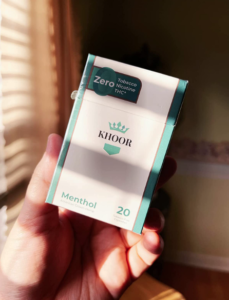
Herbal Smoking Wellness: All You Need to Know
Explore the benefits and tips of herbal smoking wellness with information on health impacts, botanical choices, and DIY blends.

This article discusses the different types of tobacco-treatment medications available and their benefits for quitting smoking. The article also discusses how to resist cravings for tobacco when they occur. –
The primary addictive component of tobacco is nicotine. Numerous bodily parts become accustomed to having nicotine in them when a person uses tobacco cigarettes. When someone gives up tobacco, they also give up nicotine and are likely to experience withdrawal symptoms. This is due to the fact that the body must adjust to not having nicotine.
It is important to remember that quitting tobacco can be hard and relapse is common. To help reduce cravings, there are several medications & alternatives that are available as part of tobacco treatment programs. These medications may contain nicotine, including nicotine replacement therapy (NRT), bupropion SR (Wellbutrin), and varenicline (Chantix). NRT includes patches, gum, lozenges, nasal sprays, and inhalers which provide a lower dose of nicotine than cigarettes to help prevent withdrawal symptoms. Other prescription medications such as bupropion SR and varenicline can also help reduce cravings and decrease the pleasure associated with smoking. There are also tobacco & nicotine-free herbal cigarettes like KHOOR that help smokers continue to enjoy a cigarette but leaving the tobacco & nicotine behind.
Taking the edge off of nicotine withdrawal symptoms can also be achieved through other forms of therapy such as cognitive-behavioral therapy or hypnotherapy. In addition to these medications, FDA-approved medications such as bupropion SR (Zyban) and varenicline (Chantix) have also been shown to help people quit smoking by decreasing the pleasure from smoking and helping them cope with nicotine withdrawal symptoms.
If you are using nicotine replacement therapy (NRT), it can help you reduce your cravings and triggers withdrawal symptoms. NRT comes in several forms, including pills, inhalers, gum, patches, and lozenges. It is important to talk to your health care provider about the best form of NRT for you. For smokers who have been using cigarettes for many years or have developed a strong addiction to nicotine, it may be necessary to replace several products at once in order to successfully quit smoking. Additionally, attending a quit smoking program can help you learn healthy strategies to manage stress and resist temptation.
Using medications to help you quit smoking can also be very helpful. There are many different types of medications that can help reduce your cravings for nicotine, as well as help you to resist the urge to smoke a cigarette when tobacco craving strikes. Counselors and psychologists can also provide support and advice that may help you stay tobacco-free. Remember, when an urge to use tobacco strikes, it usually passes within five to 10 minutes.
Staying tobacco-free after you quit means being prepared for these urges and knowing how to cope with them. You don’t have to get more nicotine to ease the symptoms of withdrawal. Instead, try activities like sipping coffee or tea, going for a walk, or talking with friends. Avoiding people, places, and activities that trigger the urge is a key part of staying tobacco-free. Also, be aware that some smokeless tobaccos and cigarettes can put you at 50% greater risk of getting mouth cancer than nonusers so it’s best to avoid them altogether.
Staying tobacco-free after you quit is a long-term process. Medications that provide nicotine, such as a nicotine patch, can be used to reduce the level of nicotine in your body. Nicotine gum and short acting forms of NRT such as gum lozenges can also be used to control certain levels of nicotine in your body.
The nicotine patch releases a small steady amount of nicotine over a long period of time, while nasal sprays and inhalers offer faster relief from intense cravings. These NRTs help to replace the feeling of smoking, allowing smokers to overcome intense cravings.
SHARE ON SOCIAL!

Explore the benefits and tips of herbal smoking wellness with information on health impacts, botanical choices, and DIY blends.

Explore how KHOOR supports nicotine replacement with herbal cigarettes, success rates, and user stories for a healthier, smoke-free life.

Explore the benefits of quitting tobacco & nicotine with healthy alternatives. Improve your health and well-being with tips and data-backed advice.

Achieve your quit smoking goals with KHOOR’s supportive approach. Discover benefits, statistics, and practical tips for a healthier life.

Explore practical tips to smoke without nicotine, including product recommendations and real-life statistics to support your healthier lifestyle choices.

Explore tobacco-free alternatives with KHOOR. Learn about options like herbal cigarettes, nicotine pouches, and vaping for a healthier lifestyle.
KHOOR™ is a tobacco alternative company.
Questions? Available Mon-Sat 9am – 7pm EST (Responses within business hours or FAQ)
Email Us : support@khoor.com
Leave a Message : (855) 331-4563
Wholesale : sales@khoor.com
DISCLAIMER STATEMENT
KHOOR™ is only for use by current tobacco smokers of legal age. Statements made by KHOOR, LLC have not been evaluated by the Food and Drug Administration. These products are not intended to diagnose, treat, cure, or prevent any disease.
CALIFORNIA PROP 65: THIS PRODUCT CONTAINS CHEMICALS KNOWN TO THE STATE OF CALIFORNIA TO CAUSE CANCER AND BIRTH DEFECTS OR OTHER REPRODUCTIVE HARM (SEE: WWW.P65WARNINGS.CA.GOV). KEEP OUT OF REACH OF CHILDREN. DO NOT USE IF UNDER AGE 21, PREGNANT, LACTATING, SUFFERING FROM MEDICAL CONDITIONS OR TAKING MEDICATIONS. CONSULT YOUR DOCTOR BEFORE USING THIS PRODUCT.
DISCLAIMER: KHOOR LLC products contain zero nicotine, zero tobacco and under 0.3% thc. KHOOR LLC cannot be held liable for any positive test results on nicotine or drug tests. We cannot control or take responsibility for any substances customers may use in conjunction with KHOOR products. KHOOR disclaims any liability for any legal action or test results related to the use of our products. KHOOR assumes no responsibility for any legal charges as a result of changing local/state laws. It is buyer’s responsibility to determine if any transaction from khoor.com and its affiliates is in violation with local rules and regulations.